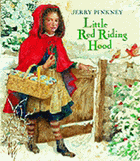
 One of Jerry Pinkney's many gifts is his ability to keep a child's sensibility front and center. In his retelling of this classic tale about the dangers of straying, the front endpapers convey the safe, snug home Little Red Riding Hood shares with her mother. Smoke rises from the chimney, tall birches extend far outside the full-bleed spread, and deer wander freely along the dirt roads. The title page shows the young heroine's mother (in a mirror image of Whistler's famous portrait of his mother), fashioning the girl's flame-colored cape while a cat plays with a spool of red thread. All of these details convey the love with which Mother extends her warning, that on her way to Grandmother's house, the girl must "be certain to go straight there." Pinkney answers the burning question of why the wolf that bars her way does not gobble down the girl right there in the woods (he "had a mind to eat her up at once--but he thought better of it when he heard the chop, chop of woodcutters working nearby"; and indeed, the woodcutters can be seen through an opening in the trees). The lupine villain devours Grandmother offstage, and readers see him licking his lips after swallowing Little Red Riding Hood whole. Even as the woodcutter delivers his fatal blow to the wolf ("with one stroke of his ax"), the only sign of violence is the shadow of the woodcutter's raised weapon, and a flurry of jays and cardinals fleeing the snow-covered firs outside of Grandmother's cozy cottage. The next scene shows Grandmother and granddaughter safely delivered from harm's way, the wolf so placid in death that he appears to be sleeping in the bed behind them. Pinkney makes the sense of relief so palpable that Grandmother's repetition of Mother's words ("Now, little miss, you be certain to go straight home") contains a whiff of humor. The closing endpapers depict a serene wood as the young heroine's red cape stands out in the wintry woods, her home just yards away, and evidence of a fire still warming the hearth. Despite the inevitable menace crucial to the story, Pinkney emphasizes the importance of family and leaves youngsters with the feeling that all is right with the world.--Jennifer M. Brown
One of Jerry Pinkney's many gifts is his ability to keep a child's sensibility front and center. In his retelling of this classic tale about the dangers of straying, the front endpapers convey the safe, snug home Little Red Riding Hood shares with her mother. Smoke rises from the chimney, tall birches extend far outside the full-bleed spread, and deer wander freely along the dirt roads. The title page shows the young heroine's mother (in a mirror image of Whistler's famous portrait of his mother), fashioning the girl's flame-colored cape while a cat plays with a spool of red thread. All of these details convey the love with which Mother extends her warning, that on her way to Grandmother's house, the girl must "be certain to go straight there." Pinkney answers the burning question of why the wolf that bars her way does not gobble down the girl right there in the woods (he "had a mind to eat her up at once--but he thought better of it when he heard the chop, chop of woodcutters working nearby"; and indeed, the woodcutters can be seen through an opening in the trees). The lupine villain devours Grandmother offstage, and readers see him licking his lips after swallowing Little Red Riding Hood whole. Even as the woodcutter delivers his fatal blow to the wolf ("with one stroke of his ax"), the only sign of violence is the shadow of the woodcutter's raised weapon, and a flurry of jays and cardinals fleeing the snow-covered firs outside of Grandmother's cozy cottage. The next scene shows Grandmother and granddaughter safely delivered from harm's way, the wolf so placid in death that he appears to be sleeping in the bed behind them. Pinkney makes the sense of relief so palpable that Grandmother's repetition of Mother's words ("Now, little miss, you be certain to go straight home") contains a whiff of humor. The closing endpapers depict a serene wood as the young heroine's red cape stands out in the wintry woods, her home just yards away, and evidence of a fire still warming the hearth. Despite the inevitable menace crucial to the story, Pinkney emphasizes the importance of family and leaves youngsters with the feeling that all is right with the world.--Jennifer M. Brown
